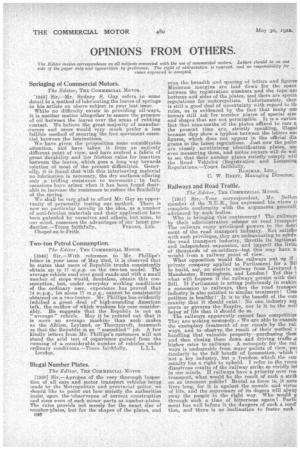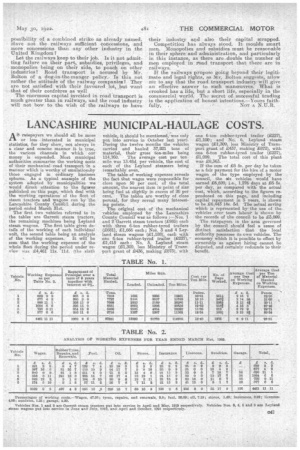OPINIONS FROM OTHERS.
Page 40

Page 41

If you've noticed an error in this article please click here to report it so we can fix it.
The Editor invites correspondence on all subjeds connected with the use of commercial motors. Letters should be on one side of the paper only and typewritten by preference. The right of abbreviation as reserved, and no responsibility for views expresed is accepted.
Syringing of Commercial Motors.
The Editor, THE COMMERCIAL MOTOR.
'1948} Sir,—Mr. Sydney S. Guy refers in some detail to a method of lubricating the leaves of springs in his article on above subject in your last issue.
While no difficulty exists in providing oil-ways, it is another matter altogether to ensure the presence of oil between the leaves over the areas of rubbing contact. We believe the great majority of manufacturers and users would very much prefer a less fallible method of securing the free movement essential between the laminations.
We have given the proposition some considerable attention, and have taken it from an entirely different point of view, and have evolved a fabric of great durability and low friction value for insertion between the leaves, which goes a long way towards solution of most of the present difficulties. Generally, it in foun,d that with this interleaving material no lubrication is necessary, the dry surfaces offering • only a trifling resistance to movement; in fact, occasions have arisen when it has been found desirable to increase the resistance to reduce the flexibility of the spring.
We shall be very glad to afford Mr. Guy an opportunity of personally testing our method. There is now no particular novelty in the idea, as a number of anti-friction Materials and their application have been patented by ourselves and others, but none, to our mind, possesses the advantages of our latest pro
duction.—Yours faithfully, FERODO, LTD. Chapel-en-le-Frith.
Two-ton Petrol Consumption.
The Editor, THE COMMERCIAL MOTOR.
[1949] Sir,—With reference to Mr. Phillips' E letter in your issue of May 23rd, it is observed that he states that users of Republic trucks consistently obtain up to 17 m.p.g. on the two-ton model. The average vehicle used over good roads and with a small number of stops would, doubtless, obtain this consumption, but, under everyday working conditions of the ordinary user, experience has proved that 14 m.p.g., let alone 17 cannot be consistently obtained on a two-tonner. Mr. Phillips has evidently imbibed a great deal or high-sounding American talk, the outflow of which weakens his case considerably. He suggests that the Republic is not an " average " vehicle. May it be pointed out that it is more an average machine than such makes as the Albion, Leyland, or Thernyeroft, inasmuch as that the Republic is an "assembled" job. A few kindly letters from Mr. Phillips's customers will not stand the acid test of experience gained from the running of a considerable number of vehicles under
ordinary conditions.—Yours faithfully, L.L.L. Lon don .
Illegal Number Plates. .
The Editor, THE COMMERCIAL MOTOR.
11950] Sir,—AproPos of the very thorough inspec tion of all cars and motor transport vehicles being made by the Metropolitan and provincial police, we should like to point out, how strictly the authorities insist upon the °observance of correct construction and sizes even of such minor parts as number-plates. The rules provide not merely for the exact size of number-plates, but for the shapes of the plates, and o443 even the breadth and spacing of letters and figures Minimum margins are laid down for the space between the registration numbers and. the tops am bottoms and sides of the plates, and there are specia regulations for motorcyclists. Unfortunately, thee is still a good deal of uncertainty with regard to th■ rules, as is evidenced by the fact that many Cue barriers still ask for number plates of special size and shapes that are not permissible. It is a curiou fact that nine-tenths of the plates affixed to cars a the present time are, strictly speaking, illegal because they show a hyphen between the letters an figures, which does not appear in the official dia
i grams n the latest regulations. Just now the polio are closely scrutinizing identification plates, an even measuring them, and motor owners will do wei to see that their number plates strictly comply witl the Road Vehicles (Registration and Licensing Regulations.—Yours faithfully,
C. W. BRETT, Managing Director.
Railways and Road Traffic.
The Editor, THE COMMERCIAL MOTOR.
[19511 Sir,—Your correspondent, Mr. Bolion member of the N.U.R., has expressed his views ii complete conformity with the arguments general: advanced by such bodies. Who is bringing this controversy? The railways by tteir administration scheme on road transport The railways enjoy privileged powers to the detri ment of the road transport industry. Not satisfie; with such privileges, ,they are endeavouring. to subdu the road transport industry, throttle its legitimat
• and independent expansion, and imperil the livim of thousands of ex-soldiers—but this may have n, weight from a railway point of view.
What opposition would the railways put up if ; private company applied to Parliament for a Bil to build, say, an electric railway from Liverpool t Manchester, Birmingham, and London? Yet this i what will happen if the railways persist with thei Bill. If Parliament is acting judiciously in makim a concession to railways, then the road transpor industry is also entitled to similar treatment ! Coin petition is healthy! It is to the benefit of the coin munity that it should exist! No one industry sup ports or governs the Empire, nor is it to the well being of life that it should do so. The railways apparently cannot face competitior They are seeking monopoly. We are able to cxamin the exemplary treatment of our canals by the rai: ways, and to observe the result of their method c handling that valuable property—purchasing then and = then closing them down and driving traffic ;,a higher rates to railArays. A monopoly for the rai. ways is undesirable from many points of view, pai
• ticularly to the full benefit of locomotion' which i not a key industry, but a freedom which the con munity has a right to uphold. I refer to the recen disastrous results of the railway strike so vividly lef in our minds. • If railways have a priority over roa transport, what would be the result of such a sink on an innocent public? Brutal as force is, it neve
• lives long, for it is against the morale and virtue of life, and the suprenaady of its dogma will alway sway the people in the right way. Who would g through such a time of bitterness again? Pa-rile znent has well before it the dangers of such a con& tion, and there is no inclination to foster such possibility of a combined striko as already named. Have not the railways sufficient concessions, and more concessions than any other industry in the United Kingdom?
Let the railways keep to their job. Is it not admitting failure on their part, subsidies, privileges, and monopolies being on their side, to poach on other industries? Road transport is accused by Mr. Bolton of a dog-in-the-manger policy. Is this not rather the attitude of the railway companies? They are not satisfied with their favoured lot, but want that of their confreres as well The enormous capital invested in road transport is much greater than in railways, and the road industry will not bow to the wish of the railways to have their industry and also their capital scrapped. Competition has always stood. It moulds smart men. Monopolies and subsidies must be reasonable in their sphere and administration, and particularly in this instance, as there are double the number of men employed in mad transport that there are in railways.
. If the railways propose going beyond their legitimate and legal rights, as No'. Bolton suggests, allow • me to say that the road transport industry will give an effective answer to such mariceuvres. What is crooked has a life, but a short life, especially in the commercial world. The secret of.. successful trading
• is the application of honest. intentions.—Yours faith
fully, NOT A












































